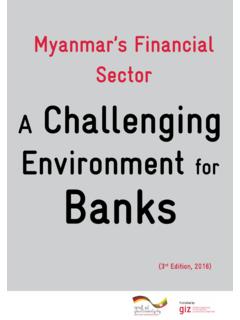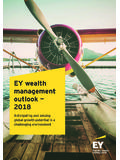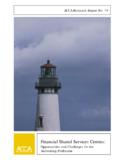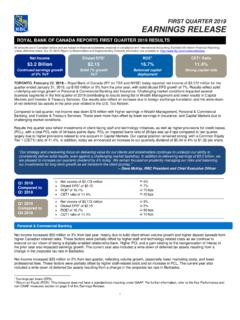Transcription of Annual Report and Financial Statements 31 December 2017
1 Company Registration No. 03468216 Ghana International Bank plc Annual Report and Financial Statements 31 December 2017 Ghana International Bank plc Annual Report and Financial Statements 2017 Contents Page Officers and professional advisers 1 Chairman s Report 2 Strategic Report 4 Directors' Report 10 Corporate governance statement 12 Directors responsibilities statement 15 Independent auditor s Report 16 Statement of comprehensive income 22 Statement of Financial position 23 Statement of changes in equity 24
2 Statement of cash flow 25 Notes to the Financial Statements 26 Ghana International Bank plc Annual Report and Financial Statements 2017 Officers and professional advisers 1 Directors Dr E. K. Y. Addison Chairman Appointed 31 May 2017 Dr Abdul-Nashiru Issahaku Chairman - Resigned 31 March 2017 Mr J R Mensah Chief Executive Officer Mr R J B Sambou Executive Director Lord P Boateng Appointed 21 February 2017 Mr H. C. G Marr Appointed 5 December 2017 Mr J. K. Arthur Appointed 31 May 2017 Dr J.
3 Ofori-Tenkorang Appointed 31 May 2017 Dr M. O. Afari Appointed 5 December 2017 Dr J. K. Mensah Appointed 5 December 2017 Company Secretary Beatrice Mettle-Nunoo, FCCA Registered office 1st Regina House 67 Cheapside 1st Floor London EC2V 6AZ Company Registration No. 03468216 Registered in England and Wales Ghana International Bank plc is a public limited company and is limited by shares. Auditor Deloitte LLP Statutory Auditor London United Kingdom 2 Ghana International Bank plc Chairman s Report I am pleased to make my first chairman s Report to members of Ghana International Bank plc ( GHIB / the Bank ).
4 Your Bank has a long and proud heritage, going back over 19 years within which, the Bank has gradually grown its footprints across the Africa space to include Kenya, Nigeria Tanzania, Egypt, Gabon, Ghana and other west African countries. Despite an extraordinarily eventful 2017, in which the Bank was faced with significant but surmountable regulatory requirements, the death of a senior staff member (Head of Compliance and MLRO), challenging market conditions including much increased competition as well as a legal challenge involving a former Executive Director, the Bank remained steadfast in its dedication to our customers and resilience in overcoming the challenges to deliver a satisfactory return of percent ( percent) to our shareholders.
5 The Global Economy Over 2017 Global economic growth was robust over 2017, supported by increased investments, manufacturing activity and trade, alongside general accommodative monetary policies. OECD economies, which collectively generate nearly 82 percent of global output, registered good performances with China, India, the United States of America (USA) and Eurozone registering improvements in real output growth. Economic activity in emerging market economies was however subdued and expanded at a much slower pace.
6 Sustainability of the rebound in global output will however, hinge on the effectiveness of governments managing the menace of high indebtedness and lower investment spending, which currently confronts many economies. Increased talk of protectionism as well as trade re-alignment were a notable presence in 2017 with the USA, particularly vociferous and fuelling the likelihood of retaliatory trade wars, and raising the risk of a dysfunctional global economy in the medium term.
7 In spite of the foregoing, the upturn in the global economy paints an encouraging picture following years of feeble growth. The return to growth in the Eurozone was underpinned by sturdier improvements in consumer and business confidence as well as relatively low borrowing costs and contributed to the lowering of unemployment across the zone. Growth in the United Kingdom (UK) however moderated as the complexities of negotiating and implementing Brexit impacted on long-term outlook.
8 In the United States of America, there was sustained impetus, buoyed by soaring business and consumer confidence as well as buoyant asset prices, which continue to drive investment growth. China s transformation from an export-reliant, heavy manufacturing economy to a value-added, consumer and services-driven economy, also gathered momentum as the world s second largest economy delivered remarkably strong growth on the back of infrastructure investment drive. Sub-Saharan Africa (SSA) fared less well although growth outlook was much improved from previously.
9 A rebound in hydrocarbon and agricultural output contributed to a nascent recovery but policy uncertainties as well as political risks continue to pose a downside risk. Notably, the region s largest economies, Nigeria and South Africa, made modest recoveries from economic recession during 2017. Nigeria saw increased economic activity, underpinned by increased manufacturing orders as well as raised oil production, as the credit squeeze that had engulfed the country for nearly 18 months finally eased.
10 In South Africa, upside risk to inflation was elevated, despite a widening trade surplus. However, policy and political uncertainties combined to threaten a downgrade to the country s sovereign ratings. Other economies in the region also registered signs of emerging stability. Senegal and Rwanda benefited from business friendly reforms while Ethiopia benefited from continued infrastructure investment. In Ghana, the uptick in growth was attributed to rising industrial and energy output on the back of much increased upstream oil production, and also coincided with inflation and debt levels subsiding over the period.








